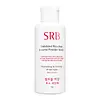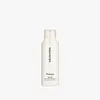What's inside
What's inside
 Key Ingredients
Key Ingredients

 Benefits
Benefits

 Concerns
Concerns

 Ingredients Side-by-side
Ingredients Side-by-side

Zea Mays Starch
AbsorbentSodium Cocoyl Isethionate
CleansingSodium Lauroyl Glutamate
Oryza Sativa Bran Extract
Skin ConditioningCitrus Grandis Seed Extract
AstringentPollen Extract
EmollientAllantoin
Skin ConditioningCollagen
MoisturisingBetaine
HumectantAloe Barbadensis Leaf Juice
Skin ConditioningSorbitol
HumectantIsopropyl Palmitate
EmollientAscorbyl Palmitate
AntioxidantCI 77891
Cosmetic ColorantCitric Acid
BufferingDisodium EDTA
Papain
Skin ConditioningParfum
MaskingZea Mays Starch, Sodium Cocoyl Isethionate, Sodium Lauroyl Glutamate, Oryza Sativa Bran Extract, Citrus Grandis Seed Extract, Pollen Extract, Allantoin, Collagen, Betaine, Aloe Barbadensis Leaf Juice, Sorbitol, Isopropyl Palmitate, Ascorbyl Palmitate, CI 77891, Citric Acid, Disodium EDTA, Papain, Parfum
Zea Mays Starch
AbsorbentSodium Cocoyl Isethionate
CleansingSodium Lauroyl Glutamate
Sodium Palmitate
CleansingDiglycerin
HumectantJuglans Regia Shell Powder
AbrasiveOryza Sativa Powder
Citric Acid
BufferingPanax Ginseng Root Extract
EmollientRosmarinus Officinalis Leaf Extract
AntimicrobialScutellaria Baicalensis Root Extract
AstringentTricholoma Matsutake Extract
Skin ConditioningAngelica Keiskei Leaf/Stem Extract
Skin ConditioningOryza Sativa Extract
AbsorbentPortulaca Oleracea Extract
Skin ConditioningArbutin
AntioxidantRice Ferment Filtrate
Skin ConditioningGossypium Herbaceum Extract
Skin ConditioningLactobionic Acid
BufferingAllantoin
Skin ConditioningMaltodextrin
AbsorbentPapain
Skin ConditioningWater
Skin ConditioningGlycerin
HumectantButylene Glycol
HumectantSodium Benzoate
MaskingParfum
MaskingZea Mays Starch, Sodium Cocoyl Isethionate, Sodium Lauroyl Glutamate, Sodium Palmitate, Diglycerin, Juglans Regia Shell Powder, Oryza Sativa Powder, Citric Acid, Panax Ginseng Root Extract, Rosmarinus Officinalis Leaf Extract, Scutellaria Baicalensis Root Extract, Tricholoma Matsutake Extract, Angelica Keiskei Leaf/Stem Extract, Oryza Sativa Extract, Portulaca Oleracea Extract, Arbutin, Rice Ferment Filtrate, Gossypium Herbaceum Extract, Lactobionic Acid, Allantoin, Maltodextrin, Papain, Water, Glycerin, Butylene Glycol, Sodium Benzoate, Parfum
 Reviews
Reviews

Ingredients Explained
These ingredients are found in both products.
Ingredients higher up in an ingredient list are typically present in a larger amount.
Allantoin is a soothing ingredient known for its protective and moisturizingg properties. Because of this, it is often added to products with strong active ingredients.
Studies show higher concentrations of this ingredient can promote wound healing.
Though it can be derived from the comfrey plant, allantoin is produced synthetically for cosmetic products to ensure purity.
Learn more about AllantoinCitric Acid is an alpha hydroxy acid (AHA) naturally found in citrus fruits like oranges, lemons, and limes.
Like other AHAs, citric acid can exfoliate skin by breaking down the bonds that hold dead skin cells together. This helps reveal smoother and brighter skin underneath.
However, this exfoliating effect only happens at high concentrations (20%) which can be hard to find in cosmetic products.
Due to this, citric acid is usually included in small amounts as a pH adjuster. This helps keep products slightly more acidic and compatible with skin's natural pH.
In skincare formulas, citric acid can:
While it can provide some skin benefits, research shows lactic acid and glycolic acid are generally more effective and less irritating exfoliants.
Most citric acid used in skincare today is made by fermenting sugars (usually from molasses). This synthetic version is identical to the natural citrus form but easier to stabilize and use in formulations.
Read more about some other popular AHA's here:
Learn more about Citric AcidPapain is an enzyme found naturally in the papaya plant's leaves, fruit, and roots. It has antimicrobial, soothing, and wound healing properties.
Glycine and Vitamin A are naturally found in papain.
While papain is often touted as skin-lightening, further studies are needed to prove this. However, papain has been shown to help soothe acne-inflammation.
Papain belongs to a class of enzymes called proteolytic enzymes. These enzymes break down peptides and amino acids.
Some studies found papain to be a potential skin sensitizer and allergen. Those with latex allergies might also be allergic to papaya.
Learn more about PapainParfum is a catch-all term for an ingredient or more that is used to give a scent to products.
Also called "fragrance", this ingredient can be a blend of hundreds of chemicals or plant oils. This means every product with "fragrance" or "parfum" in the ingredients list is a different mixture.
For instance, Habanolide is a proprietary trade name for a specific aroma chemical. When used as a fragrance ingredient in cosmetics, most aroma chemicals fall under the broad labeling category of “FRAGRANCE” or “PARFUM” according to EU and US regulations.
The term 'parfum' or 'fragrance' is not regulated in many countries. In many cases, it is up to the brand to define this term.
For instance, many brands choose to label themselves as "fragrance-free" because they are not using synthetic fragrances. However, their products may still contain ingredients such as essential oils that are considered a fragrance by INCI standards.
One example is Calendula flower extract. Calendula is an essential oil that still imparts a scent or 'fragrance'.
Depending on the blend, the ingredients in the mixture can cause allergies and sensitivities on the skin. Some ingredients that are known EU allergens include linalool and citronellol.
Parfum can also be used to mask or cover an unpleasant scent.
The bottom line is: not all fragrances/parfum/ingredients are created equally. If you are worried about fragrances, we recommend taking a closer look at an ingredient. And of course, we always recommend speaking with a professional.
Learn more about ParfumSodium cocoyl isethionate is a natural ingredient from coconut oil. It is an ultra gentle cleanser that gives a nice foam without drying the skin or impacting the skin barrier.
The amount of foam created depends on the amount of sodium cocoyl isethionate used in the product.
This ingredient also helps improve the spreadability of a product.
Learn more about Sodium Cocoyl IsethionateSodium Lauroyl Glutamate is the sodium salt from the lauric acid of glutamic acid.
It is a surfactant and helps cleanse the skin. Surfactants gather oil, dirt, and other pollutants from your skin so they may be washed away easily.
Zea Mays Starch is starch made from corn. You might know this as cornstarch . It is used to thicken a product. It can replace talc as an absorbent.
The pH of cornstarch is 5.92.
Cornstarch is a common food ingredient used to thicken soups or to make corn syrup.
Learn more about Zea Mays Starch